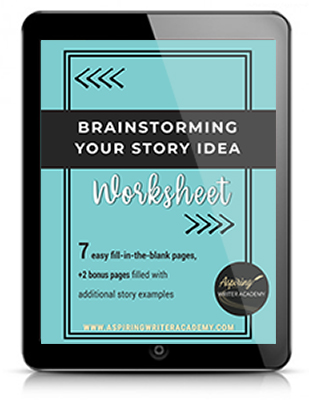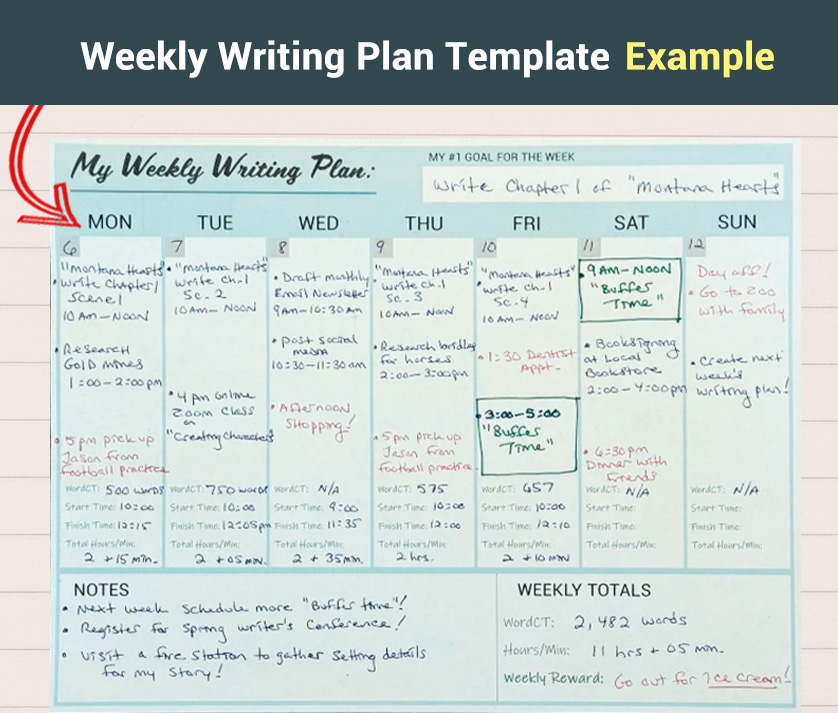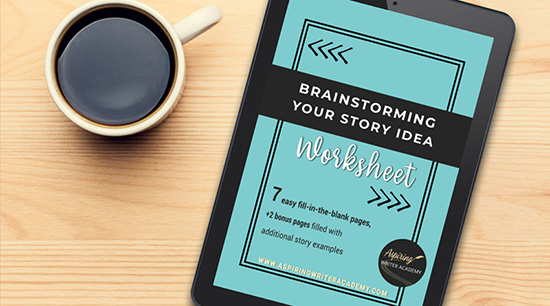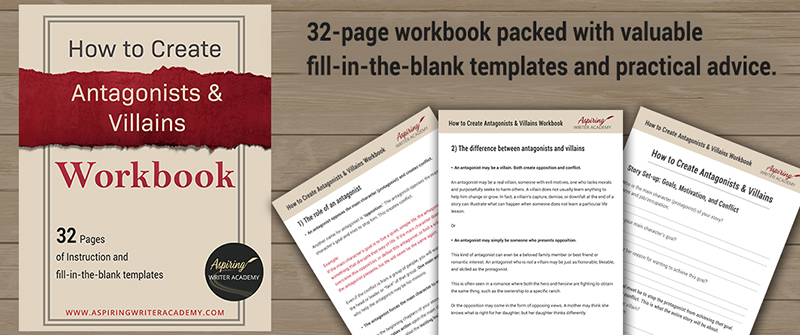How to Get More Done with a Weekly Writing Plan!

Do you schedule blocks of time to focus on writing your novel each week? Or is writing a hit or miss depending on your personal life? Does having a plan seem too rigid? Are you frustrated because you are not achieving the goals you set out to do weekly, in a month, 90 days, or a year?
In How to Get More Done with a Weekly Writing Plan, we show you how to create a flexible plan to help you write more, track your progress, keep you accountable, and celebrate your success.
In the post below we will discuss:
- How to Plan Your Week
- How to Track Your Week
- Accountability & Celebrating Achievement
Why You Need a Weekly Plan for Your Writing
First let’s talk about ‘planners.’ Do they really keep you accountable?
Each fall multitudes of different style planners go on sale with ads promising to keep you on track the following year.
I love buying new portable planners that you can take with you wherever you go. I’ve tried dozens of them, sometimes buying two or three with different layouts in one year.
Do they work?
No. Not all of them. At least not for me. Usually, halfway through the year I give up. I might buy a new one or resort to just listing my to-dos on notebook paper.
So, what happened? Why didn’t their system work for me?
Everyone is different but a planner is just a book of spiral bound pages of monthly/weekly calendars and if you do not use it in a way that focuses on your goals (such as writing a novel) and have a system to keep you focused and accountable…you may find you aren’t making much progress.
A better method is to have a weekly plan.
Why weekly? Don’t most of the hot-shot entrepreneurs recommend setting 90-day goals?
90-day goals are great because it focuses on 3 months at a time (a season) instead of a whole year. This cuts down on procrastination. Yet, for me, even 90 days was too long. I got off to a good start but then I’d slowly miss a few target goals and get behind and never be able to catch up. By the end of the month, or 90 days, my achievement would be so far off the mark it would leave me depressed.
I would start another goal list for the next 90 days or month and the same thing would happen again. The schedule/goals I had set for myself week after week was not sustainable. I didn’t allow for any personal emergencies or much needed downtime. If more than one thing happened to throw me off track, the whole plan was thrown off track. Even if I promised myself to catch up, I was always on the hamster wheel and I never could make up for lost time.
This takes a toll on your mental state—when you are always behind and never able to catch up you start to feel overwhelmed, stressed, exhausted, depressed, and feel like a ‘failure.’ You might even start to compare yourself with other writers and wonder why you can’t produce as many finished books or written words in a day as they can.
A daily plan is too restrictive—but weekly? I can handle a realistic weekly schedule and reduce stress and disillusionment on how much I can really get done.
Do I still buy planners and set 90-day goals? Yes, I do, but it’s the WEEKLY PLAN that helps me follow through and achieve my writing goals to make those other tools worthwhile.
How this can work for you:
It’s time to boost your self-confidence, take back control, and create a writing schedule that you can actually sustain. Get excited about your writing again and feel like a ‘success!’
Learn to create a weekly schedule that gives you flexibility but also keeps you accountable and on target to finish your writing projects.
1) How to Plan Your Week
Download our free Weekly Writing Plan template so that you have a full blank page before you that only focuses on one week. (Or you can also use a planner that has a two-page spread for one week, giving you enough space for sticky notes and multiple tasks on each ‘day.’ However, one paper is easier to carry around than a full book.)
Next, look at your planner or calendar listing appointments and personal obligations that must be fulfilled, and transfer those times onto your Weekly Writing Plan. If you have a vacation planned, cross off those days that you will not be available to write. If you need to call someone for their birthday, or meet someone for lunch, write their name down as well. Phone calls take up precious time in our schedules. So does social media!
Now look at the blocks of time that are left each day. Between which hours will you write? Schedule it just as you would schedule an appointment. (In fact, tell others who try to steal this time away from you to do other things—“Sorry, I can’t, I have an appointment.”) You may have to set boundaries with overly intrusive family members and friends. Let them know that your writing time is important to you. If needed, get up an hour earlier or stay up an hour later each day to include writing time. Even 15-30 minutes can produce a finished story over time.
What exactly will you work on each day? Write that on a sticky note in your planner or on your Weekly Writing Plan template and place it on the appropriate day.
Example:
Monday
“Montana Hearts”
Finish Chapter 1 Scene 2 & 3
Tuesday
“Montana Hearts”
Research ‘gold mines’
Friday
“Montana Hearts”
Outline Chapters 2 – 6
The last step is to take a critical look at your Weekly Writing Plan. Is this plan realistic? Can you really complete the task you outlined within the hours available? Is there anything in the schedule that you need to change?
The reason we use sticky notes is because they can be moved around. If you mess up one day, you can usually make up for it by the end of the week if you are only focusing on what you aim to accomplish one week at a time. Everyone has a bad day every now and then. Simply move that sticky note to a different day and time.
You must also consider your energy levels. Can you really drop the kids off at school, go to lunch with a friend, run errands, and still have the energy to come home and write a chapter of your novel? Ask yourself—are your expectations too high? You might be able to pull this off for one or two days, but is it sustainable for a whole week?
You also need to add “buffer time” into your schedule. You might want to take one full day off at the end of the week to ‘catch up’ if needed or to take some downtime for yourself. That way if you get sick and miss a day, you can use your buffer day to still meet your goals for the week. Or you might want to schedule some buffer time at the end of each day. Unexpected emergencies, visits, and events do pop up to try to throw off your day, but if you have buffer time built into your schedule, you can still make forward progress on your writing. If you do not need the buffer time, you can use the opening in your schedule to write even more! Get ahead for once! And you will feel great!
For those of you who are saying, “My schedule is already so busy that I don’t have any time left for ‘buffer time’ in addition to writing, I would advise you to take a hard look at all your commitments. Life is about choices. Do you really need to meet that friend for lunch this week? Do you really have to volunteer for that community project? Can you order take-out food or buy pre-made dinners twice a week, so you don’t have to spend so much time cooking? Do you really need to watch that television show? Or spend twenty minutes on Facebook? It all comes down to priorities. If writing is important to you, find a creative way to open your schedule so you can finish your fictional novel. How bad do you want this?
Before you take on any new commitment, pause and remember—any time you say ‘yes’ to something (consciously or unconsciously), you are saying ‘no’ to something else. Is that new commitment worth sacrificing your writing time or much needed time to rest?
2) How to Track Your Week
Look at Your Weekly Writing Plan (which is also your weekly life plan) first thing each morning, throughout the day, and keep on your desk when you write. Carry this plan with you wherever you go. (Will you really take your big planner book with you or is a one-page printed sheet easier to fold up and keep in your pocket or purse?)
You need to be able to see your plan to follow your plan or you will forget what you should be doing, and time will get away from you.
Track your writing time:
- You can record your new wordcount for each writing session so that you can see how much you progressed by the end of the week.
- You can write down your start and finish time for each writing session and record each day how many hours and minutes you wrote. Total at the end of the week.
- Brainstorming, research, outlining, creating plot maps and collages and anything else that helps you create your fictional novel should also be included in these timed sessions. Back cover blurbs, synopsis, and book proposals also count.
- At the end of the week, evaluate how you did. Look at what worked, what didn’t, and how you can do better next week.
- Print out and create a new Weekly Writing Plan for the following week. Unfinished tasks from the previous week can go into the new plan. This allows you to create a new plan each week that uses the time you have available without piling on extra unrealistic expectations. Each week is a new chance for success!
- In the back of a planner or on a chart on the wall in your office you may want to create a chart listing the wordcount or time spent writing totals for each month for a year and add up at year’s end. Or do this for each 90-day period. This allows you to see your progress over longer periods of time.
3) Accountability & Celebrating Achievement
If you do not have a writing buddy who can keep you accountable, you may want to join a few writing groups (local or online) to meet others who share your struggles as a writer. Having someone to ‘report’ to encourages you to meet your goals.
Or you can put a smiley sticker on each day of your Weekly Writing Plan that you achieved your goal or had a good work session. It is amazing how motivating it is to get a simple smiley sticker—you will find you will not want to break the chain! If you need more motivation, you can also create little rewards for yourself.
Each time you get a smiley sticker, you can give yourself a little reward. Maybe an extra half hour of TV, or a special treat, or pay yourself a couple dollars so that at the end of a month you can get a massage. Or perhaps you can give yourself a weekly reward.
Also be sure to celebrate the small wins.
Let’s face it, writing is hard. Instead of beating yourself up thinking you didn’t do enough this week, celebrate what you DID achieve.
If your work moved your story forward at all, you are making progress. If anyone asks, “Have you finished your book yet?” Respond with enthusiasm— “Not yet, but I’m making forward progress every day!”
You are a writer.
Any progress is forward progress toward achieving your dream of a finished novel.
We hope you have enjoyed How to Get More Done with a Weekly Writing Plan and that you have gained some valuable tips to create a flexible plan for your writing that allows you to achieve your goals, boost your confidence, and find success.
If you have any questions or would like to leave a comment below, we would love to hear from you!
If you like more help developing your story, you may wish to download our Free Brainstorming Your Story Idea Worksheet
Do you find it difficult to create compelling antagonists and villains for your stories? Do your villains feel cartoonish and unbelievable? Do they lack motivation or a specific game plan? Discover the secrets to crafting villains that will stick with your readers long after they finish your story, with our How to Create Antagonists & Villains Workbook.
This 32-page instructional workbook is packed with valuable fill-in-the-blank templates and practical advice to help you create memorable and effective antagonists and villains. Whether you're a seasoned writer or just starting out, this workbook will take your writing to the next level.
We Believe All Authors Can Aspire to Take Their Writing to the Next Level!
Our Goal for Aspiring Writer Academy is to help people learn how to write quality fiction, teach them to publish and promote their work, and to give them the necessary tools to pursue a writing career.

ENTER YOUR EMAIL BELOW
TO GET YOUR FREE
"Brainstorming Your Story Idea Worksheet"
7 easy fill-in-the-blank pages,
+ 2 bonus pages filled with additional story examples.
A valuable tool to develop story plots again and again.
Other Blog Posts You May Like
How to Write Your Very First Fiction Novel
How to Plot: One Central Storyline
How to Use ‘The Hero’s Journey’ to Plot Your Novel
10 Tips for Using Flashbacks in Your Fictional Novel
How to Use Framing Techniques in Your Fictional Novel
How to Write a Novel with the W-Plot Template
How to Use Themes in Your Fictional Story
Fiction Writing: What is a Pinch Point?
7 Tips for Writing a Story Synopsis
Fiction Writing: What is the ‘Black Moment?’
Fiction Writing: What is the ‘Man in the Mirror Moment?’
Fiction Writing: What is a Plot Hole?
How to Write Act III and Finish Your Fictional Story in 5 Steps
Structuring Act II (Part 2) for Maximum Impact: How to Keep Readers Engaged
Structuring Act II (Part 1) for Maximum Impact: How to Keep Readers Engaged
How to Use Setting to Intensify Your Fictional Scenes
How to Manipulate Pacing to Increase the Intensity of Your Scenes in a Fictional Novel
How to Brainstorm a New Novel Using Goal, Motivation, and Conflict
Fiction Writing: How to Plot a Story where the Antagonist is an ‘Invisible Foe’
Fiction Writing: Create a Storyboard to Map Out Your Scenes
3 Ways to Avoid Writing ‘Episodic’ Scenes in Fiction
How to Write Act I: Opening Scenes for Your Fictional Story
How to Plot Your Fictional Novel (with Free Template Included)
5 Questions to Create Believable Villains

is a multi-published author, speaker, and writing coach. She writes sweet contemporary, inspirational, and historical romance and loves teaching aspiring writers how to write quality fiction. Read her inspiring story of how she published her first book and launched a successful writing career.
































